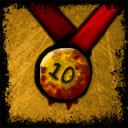Instalar o Steam
Iniciar sessão
|
Idioma
简体中文 (Chinês Simplificado)
繁體中文 (Chinês Tradicional)
日本語 (Japonês)
한국어 (Coreano)
ไทย (Tailandês)
Български (Búlgaro)
Čeština (Checo)
Dansk (Dinamarquês)
Deutsch (Alemão)
English (Inglês)
Español-España (Espanhol de Espanha)
Español-Latinoamérica (Espanhol da América Latina)
Ελληνικά (Grego)
Français (Francês)
Italiano (Italiano)
Bahasa Indonesia (Indonésio)
Magyar (Húngaro)
Nederlands (Holandês)
Norsk (Norueguês)
Polski (Polaco)
Português (Brasil)
Română (Romeno)
Русский (Russo)
Suomi (Finlandês)
Svenska (Sueco)
Türkçe (Turco)
Tiếng Việt (Vietnamita)
Українська (Ucraniano)
Relatar problema de tradução


 United States
United States 



























































א (Aleph): Represents a glottal stop, like the "a" in "father."
ב (Bet/Vet): Sounds like "b" (as in "bat") or "v" (as in "vat"), depending on context.
ג (Gimel): Similar to the "g" in "go."
ד (Dalet): Like the "d" in "dog."
ה (He): Sounds like "h" (as in "hat").
ו (Vav): Similar to "v" (as in "vat") or "w" (as in "wonder").
ז (Zayin): Like the "z" in "zebra."
ח (Het): A guttural sound, similar to the Scottish "loch" or the Spanish "j" in "jalapeño."
ט (Tet): Similar to the "t" in "top."
י (Yod): Like the "y" in "yes."
כ (Kaf): Sounds like "k" (as in "kite") or "ch" (as in "loch").
ל (Lamed): Similar to the "l" in "love."
מ (Mem): Like the "m" in "mother."
Feel free to practice these sounds and explore more about biblical Hebrew! 😊📜